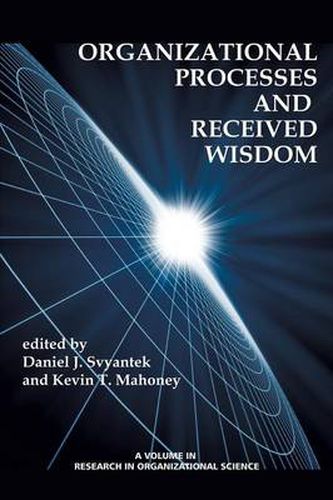Readings Newsletter
Become a Readings Member to make your shopping experience even easier.
Sign in or sign up for free!
You’re not far away from qualifying for FREE standard shipping within Australia
You’ve qualified for FREE standard shipping within Australia
The cart is loading…






This title is printed to order. This book may have been self-published. If so, we cannot guarantee the quality of the content. In the main most books will have gone through the editing process however some may not. We therefore suggest that you be aware of this before ordering this book. If in doubt check either the author or publisher’s details as we are unable to accept any returns unless they are faulty. Please contact us if you have any questions.
This Research in Organizational Sciences volume explores and questions the received wisdom of organizational sciences. The chapters in this volume (and the companion volume) seek to establish boundary conditions for important organizational constructs and processes. They illustrate the importance of context for interpreting the received wisdom of organizational science by showing when constructs must be adapted to changing circumstances.
The volume begins with four chapters looking at the construct of leadership. Each of these addresses an important aspect of our understanding of leadership and its practice. The four chapters on leadership are followed by five chapters dealing with other organizational processes including motivation, organizational change, the role of diversity in organizations and organizational citizenship. The last three chapters deal with the issue of knowledge in large systems. Two chapters address how information may be transmitted across organizations and generations of workers. The final chapter deals with the use of information by organizational decision-makers.
The 12 papers in this volume all, in some way question received wisdom and present alternatives which expand our understanding of organizational behaviour. These chapters each strive to present new ways of understanding organizational constructs, and in so doing reveal how received wisdom does not always lead to best practice in research or application. It is our hope that these chapters illustrate how challenging received wisdom in organizational studies can provide new ways of thinking about organizational processes. These new ways of thinking in turn can provide better understanding of the processes necessary to increase organizational effectiveness.
$9.00 standard shipping within Australia
FREE standard shipping within Australia for orders over $100.00
Express & International shipping calculated at checkout
This title is printed to order. This book may have been self-published. If so, we cannot guarantee the quality of the content. In the main most books will have gone through the editing process however some may not. We therefore suggest that you be aware of this before ordering this book. If in doubt check either the author or publisher’s details as we are unable to accept any returns unless they are faulty. Please contact us if you have any questions.
This Research in Organizational Sciences volume explores and questions the received wisdom of organizational sciences. The chapters in this volume (and the companion volume) seek to establish boundary conditions for important organizational constructs and processes. They illustrate the importance of context for interpreting the received wisdom of organizational science by showing when constructs must be adapted to changing circumstances.
The volume begins with four chapters looking at the construct of leadership. Each of these addresses an important aspect of our understanding of leadership and its practice. The four chapters on leadership are followed by five chapters dealing with other organizational processes including motivation, organizational change, the role of diversity in organizations and organizational citizenship. The last three chapters deal with the issue of knowledge in large systems. Two chapters address how information may be transmitted across organizations and generations of workers. The final chapter deals with the use of information by organizational decision-makers.
The 12 papers in this volume all, in some way question received wisdom and present alternatives which expand our understanding of organizational behaviour. These chapters each strive to present new ways of understanding organizational constructs, and in so doing reveal how received wisdom does not always lead to best practice in research or application. It is our hope that these chapters illustrate how challenging received wisdom in organizational studies can provide new ways of thinking about organizational processes. These new ways of thinking in turn can provide better understanding of the processes necessary to increase organizational effectiveness.